|
|
|
Sort Order |
|
|
|
Items / Page
|
|
|
|
|
|
|
| Srl | Item |
| 1 |
ID:
143368


|
|
|
|
|
| Summary/Abstract |
We examine how the system of “federalism, Chinese style” functions in the context of land allocation. China's land laws give provision of land a central role in local officials' growth promotion strategies. Requisitions of farmland by local authorities have engendered significant rural unrest. In response, the central government has attempted to re-establish control over the pace of urban land expansion by enacting regulations limiting conversion of rural land to urban uses. We derive theoretically the conditions under which non-compliance with such regulations is optimal. An econometric investigation shows that legal restrictions on farmland conversion had little or no effect on rates of farmland loss but did limit urban spatial growth. Our econometric evidence is consistent with limited enforcement of those legal limits on farmland conversion.
|
|
|
|
|
|
|
|
|
|
|
|
|
|
|
|
| 2 |
ID:
160539


|
|
|
|
|
| Summary/Abstract |
This paper provides a systematic overview of the intergovernmental fiscal transfer system in Indonesia. It describes the size, allocation mechanism, and economic rationale (if any) of the different transfer schemes. Furthermore, the study points out major changes in the institutional set-up and in the relative magnitudes of the transfers effected by the Joko “Jokowi” Widodo administration. This allows us to assess the extent to which the current administration has shifted the policy stance on (fiscal) decentralization in the country. We critically evaluate the effectiveness and efficiency of the existing system, including the newly implemented reforms.
|
|
|
|
|
|
|
|
|
|
|
|
|
|
|
|
| 3 |
ID:
190170
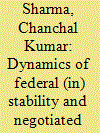

|
|
|
|
|
| Summary/Abstract |
Many studies have demonstrated a trend towards greater centralization of the federal system in India since 2014. However, the causal mechanisms that underpin this centralization remain underexplored. This article systematically explores the processes involved in tipping the delicate federal balance in favour of greater central control, and in doing so pays particular attention to the role of the party system therein. Our analytical narrative is structured around the assertion that ‘negotiated cooperation’ is contingent upon: (a) the interaction between constitutional structure and federal politics; (b) the capacity and willingness of subnational incumbents to safeguard their policy space and (c) the nature of party organization and the ideological disposition of the polity-wide parties towards territorial power-sharing. Drawing from India’s experience since 1952, we demonstrate that a dominant party system does not necessarily entail encroachment on subnational authority. At the most, it is a necessary but insufficient condition for federal imbalance. However, the problem of federal encroachment arises only when the dominant party is internally centralized and personalized, advocates unitarism and operates in a context of weak constitutional, political, procedural and judicial safeguards for self-and shared-rule. India under the leadership of Indira Gandhi, but more recently of Narendra Modi, comes close to meeting these conditions.
|
|
|
|
|
|
|
|
|
|
|
|
|
|
|
|
| 4 |
ID:
087212
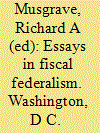

|
|
|
|
|
| Publication |
Washington, D C, Brookings Institution, 1965.
|
| Description |
xvi, 301p.
|
|
|
|
|
|
|
|
|
|
|
|
Copies: C:1/I:0,R:0,Q:0
Circulation
| Accession# | Call# | Current Location | Status | Policy | Location |
| 018426 | 336.3/MUS 018426 | Main | On Shelf | General | |
|
|
|
|
| 5 |
ID:
111660
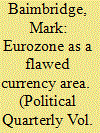

|
|
|
|
|
| Publication |
2012.
|
| Summary/Abstract |
The European single currency system has come under unprecedented strain during the past three years and there is little reason to assume that this will diminish, in any significant way, in the near future. This article briefly explores the background to the current eurozone crisis before outlining a number of potential solutions. Specifically, we discuss how the credit crunch induced recession of 2008 triggered the problems within the eurozone regarding sovereign debt, looking at the issues of spill-over and free-rider effects, together with the implementation of EMU fiscal rules. The analysis is then extended by outlining a series of potential remedies. This consists of a critical evaluation of solutions that the EU has already instigated (i.e. moral persuasion, financial relief measures and debt default), together with a series of alternative propositions (i.e. fiscal federalism and a European Clearing Union) and even the collapse of the euro.
|
|
|
|
|
|
|
|
|
|
|
|
|
|
|
|
| 6 |
ID:
148682
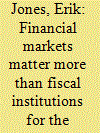

|
|
|
|
|
| Summary/Abstract |
Many argue that the euro is handicapped as a currency because European governments are unwilling to pool responsibility for fiscal policy in common institutions. This argument is derived from the theory of optimum currency areas and fuelled by analogy with US experience. It is mistaken. A monetary union does not need a fiscal union to work. Worse, efforts to build European fiscal institutions are likely to distract European policymakers from a more important agenda. Europe needs a fully functioning banking union with a common risk-free asset if Europeans want to stabilise the euro as a common currency. Moreover, it would need these things even if the euro did not exist and all it had was the common market. Financial stability – and not fiscal federalism – is the key to Europe's future. European policymakers should focus their efforts on building the necessary institutions.
|
|
|
|
|
|
|
|
|
|
|
|
|
|
|
|
| 7 |
ID:
123712
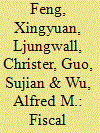

|
|
|
|
|
| Publication |
2013.
|
| Summary/Abstract |
China's central-local relations have been marked by perpetual changes amidst economic restructuring. Fiscal decentralization on the expenditure side has been paralleled by centralization on the revenue side, accompanied by political centralization. Hence, our understanding of China's fiscal relations is not without controversy. This paper aims to make a theoretical contribution to the ongoing debate on 'fiscal federalism' by addressing crucial questions regarding China's central-local fiscal relations: first, to what extent do Chinese central-local fiscal relations conform to fiscal federalism in the Western literature? Second, are there any problems with existing principles of fiscal federalism and, if so, how to refine them? Third, how are refined principles relevant to the Chinese case and what policies should the Chinese government pursue in the future? Based on an in-depth and critical review of the theories on fiscal federalism, we develop a refined prototype of fiscal federalism. The model shows that quasi-traditional fiscal federalism is a much closer reality in China, while we argue that the refined fiscal federalism should be the direction of future reform in China.
|
|
|
|
|
|
|
|
|
|
|
|
|
|
|
|
| 8 |
ID:
073076
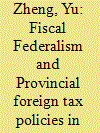

|
|
|
| 9 |
ID:
108583
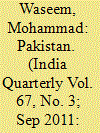

|
|
|
|
|
| Publication |
2011.
|
| Summary/Abstract |
Underlying Pakistan's three experiments with a federal arrangement in the form of the 1956, 1962 and 1973 constitutions, there has been a persistent concern about constraining the numerical majority of the largest province, first East Bengal and later Punjab. The first two constitutions had virtually eliminated the federal principle in West Pakistan by merging the four provinces and various princely states into one megaprovince called One-Unit in order to establish parity between the two wings of the state. In post-Bangladesh Pakistan, while the 1973 Constitution provided a strong centre with scant provincial autonomy, it tacitly acknowledged the linguistic majorities of the four provinces as legitimate representatives of their respective federating units. Together, these developments brought the issue of provincial autonomy to the centre of the stage in Punjab-dominated national politics championed by the three smaller provinces of Sindh, Balochistan and Khyber-Pakhtunkhwa. 37 years after the promulgation of the 1973 Constitution, the 18th Amendment finally addressed this issue with full strength. Pakistan in the following half decade is expected to experience what by all means is going to be a tempestuous process of shifting several ministries and divisions from the federal to provincial capitals. There can be resistance from the army and the centralist bureaucracy against the perceived dilution of state authority on the one hand and 'minorities' from the three smaller provinces against their perceived persecution at the hands of the majority communities of these provinces on the other.
|
|
|
|
|
|
|
|
|
|
|
|
|
|
|
|
| 10 |
ID:
160429
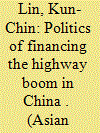

|
|
|
|
|
| Summary/Abstract |
Fiscal federalism has provided the institutional basis for the rapid highway boom in China for three decades, creating a close linkage between subnational investment and revenue claims on tolled roads. This model of capitalization is financially unsustainable and undermines the standardization of taxation and contracting of public–private partnership projects.
|
|
|
|
|
|
|
|
|
|
|
|
|
|
|
|
| 11 |
ID:
095088
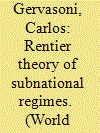

|
|
|
|
|
| Publication |
2010.
|
| Summary/Abstract |
Levels of subnational democracy vary significantly within countries around the world. Drawing on fiscal theories of the state, the author argues that this variance is often explained by a type of rentierism that is not geographically determined by natural resources but politically created by certain fiscal federalism arrangements. He posits that less democratic regimes are more likely in rentier provinces-those that receive disproportionately large central government transfers and practically forgo local taxation. Intergovernmental revenue-sharing rules that produce large vertical fiscal imbalances and favor the economically smaller districts provide their incumbents with generous "fiscal federalism rents" that allow them to restrict democratic contestation and weaken checks and balances. Statistical evidence from a panel data set of the Argentine provinces strongly confirms this expectation, even after controlling for standard alternative explanations such as level of development. Sensitivity analysis shows that this finding is extremely robust to alternative panel estimators. Qualitative and quantitative evidence suggests that the effect of heavy public spending on the economic autonomy of political actors is the main causal mechanism at work.
|
|
|
|
|
|
|
|
|
|
|
|
|
|
|
|
| 12 |
ID:
082031
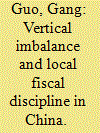

|
|
|
|
|
| Publication |
2008.
|
| Summary/Abstract |
This article examines local fiscal behavior in contemporary China against the backdrop of decentralized spending responsibilities and recentralized revenues. Vertical imbalance after the 1994 tax-sharing system reform, coupled with other features of the fiscal institutions, is not conducive to conservative local fiscal behavior. Moreover, a main driving force behind the expansion of local governments is the politically motivated intergovernmental transfer scheme. The center in effect "buys" political stability in sensitive areas while holding local leaders accountable for their tax efforts. A dynamic panel analysis of Chinese counties reveals that a million-yuan increase in general transfer payment and salary raise subsidies would add, respectively, fifteen and sixteen employees to the county government payroll, other things being equal. At the same time, increased subsidies from upper-level governments do not "crowd out" or significantly affect local tax effort. Additional dynamic panel data analysis at the provincial level produced similar findings
|
|
|
|
|
|
|
|
|
|
|
|
|
|
|
|
|
|
|
|
|